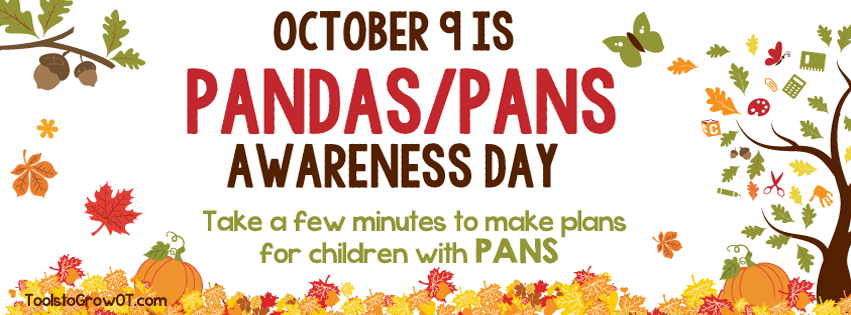PANDAS/PANS AWARENESS DAY
10.09.2014
Today, October 9th is known as Pediatric Acute Neuropsychiatric Syndrome, or PANS Awareness Day. So as to educate others on Pediatric Acute Neuropsychiatric Syndrome, Tools to Grow is extremely honored to have Janice Tona PhD, OTR as our first guest blogger. Dr. Tona is currently a clinical assistant professor in the rehabilitation science department at the University of Buffalo in New York State, USA. Her research interests include the role of Occupational Therapy in children with PANS and functional difficulties among individuals with Tourette syndrome. Please see her entire biography at the conclusion of the blog.

Autumn is underway with kids back at school, rustling leaves, pumpkin festivals, and Halloween parties - a beautiful change of season in preparation for the long winter ahead. For many children, autumn also signals illnesses – everything from allergies to the mold on leaves, to coughs and sniffles passed among classmates, to the all-too-common strep throat. Most families will manage these inconveniences with a few trips to the doctor, the drug store, and a few days off from school. However, for some children, these seemingly simple challenges to health may trigger a complex set of immune responses culminating in sudden and abrupt changes in personality and mental health including a sudden onset of obsessive and compulsive symptoms, refusal to eat, separation anxiety, nighttime bedwetting and daytime urinary frequency, deterioration in handwriting, sensory defensiveness, major depression, and loss of math skills.
It is quite likely that the connection between the simple illness and the onset of neuropsychiatric symptoms shortly thereafter will go unnoticed, as seen in this video from a family. The child may be evaluated by many physical and mental health professionals including occupational therapists in an effort to help parents answer the question “what happened to my child”? as can be seen in this video from families and doctors. Slowly, the symptoms will likely subside, but some residual problems may remain and the symptoms may return the next time the child experiences illness. These children have a recently-identified condition called Pediatric Acute-Onset Neuropsychiatric Syndrome, or PANS.
October 9 is PANS awareness day so this time of year is the perfect time to learn more about this devastating condition with strong implications for families, therapists, and teachers.

The concept of PANS began with observations at the National Institute of Mental Health (NIMH) in the mid-1980s as Dr. Susan Swedo, Dr. Judy Rapoport, and other researchers noticed that children who had recovered from Sydenham’s chorea seemed to have a high frequency of obsessive-compulsive disorder. Sydenham’s Chorea is an autoimmune neurological disorder involving excessive involuntary movements following a strep infection, such as strep throat. In Sydenham’s Chorea, antibodies produced to fight strep cross the blood-brain barrier, react with basal ganglia neurons, and trigger a neurochemical reaction that includes excessive production of dopamine in the basal ganglia. Using this model, researchers at the NIMH began researching children with strep infections and sudden-onset of OCD symptoms, and in 1998 identified 50 children with Pediatric Autoimmune Neuropsychiatric Disorder Associated with Strep (PANDAS).
The catchy acronym of PANDAS belied the devastation experienced by these children and their families when they experienced a strep infection and also failed to capture the fact that strep was not the only culprit. Since 1998, hundreds of research studies have been conducted on this condition. Dr. Thomas Insel, Director of the National Institute of Mental Health identified infectious triggers as a “frontier area in NIMH research” in this 2010 blog, and in 2012 the name PANS was introduced in this article co-authored by researchers from NIMH, Yale, and Harvard. While the exact number of children with PANS is not known, a recent publication indicates that about 2% of children have OCD, and of those, about 10-20% have PANS (Murphy, Gerardi & Leckman, 2014).

Children suspected of having PANS should see their pediatrician for an initial evaluation. Most pediatricians have heard of PANS or have heard of PANDAS, but may not be aware of the most recent research on PANS, and many families choose to travel to see a doctor that specializes in PANS to assist the local pediatrician. Some infections may be difficult to detect such as strep in places other than the throat, ongoing immune responses to mycoplasma, which causes walking pneumonia, and Lyme disease or other co-infections that can be contracted from a tick bite. Medical treatment frequently begins with antibiotics if a bacterial infection is found, and more advanced cases may require steroids or intravenous antibody treatments. Families can find information on several websites, including PANDAS network. org, which is an NIMH partner outreach program, and the International Obsessive Compulsive Disorder Foundation (IOCDF) which has dedicated this page on their website to PANS in an effort to help families and healthcare practitioners. Furthermore, IOCDF encourages doctors to test any child with a sudden-onset of OCD symptoms for infections in this public service announcement. Dozens of articles on PANS have been published in the last year alone. The Journal of Child and Adolescent Psychopharmacology will host a special edition dedicated to PANDAS/PANS in January/February of 2015, and research in this area continues be generated internationally.
There are many resources for families, healthcare providers, and school personnel available when working with a child with PANS, much of which is located on the PANDASnetwork.org website. This includes OT-specific resources such as this information, which was originally posted on the New York State Occupational Therapy Association website in 2011 and this OT practice article, also published in 2011. Occupational Therapists can be a great resource for children and families experiencing PANS and therapists should focus on accommodations for the child during exacerbation to help the child and family function despite the neuropsychiatric symptoms, and rehabilitative approaches as the child moves to remission, to try to address residual problems.
PANS exacerbations can be a traumatic time for children, families and teachers. However, armed with knowledge of the most current research, help from up-to-date resources, a strong understanding of the inextricable link between mind and body, and an optimistic outlook that this cutting-edge research may pave the way for other diagnoses, all parties involved can move forward with support and without fear or ridicule.
PANS is truly is a new frontier in mental illness, and October 9th is the day to become aware. It truly is time to make plans for children with PANS.
Janice Tona, PhD, OTR.
![]()
Dr. Tona has over 30 years of practice experience as a pediatric occupational therapist. She holds a BS in OT from Utica College, a MS in pediatric OT from the University of Pittsburgh, and PhD in Educational Psychology from the University at Buffalo. She has been teaching at the college level for over 20 years with experience at D'Youville College and most recently at the University at Buffalo, where she is a clinical assistant professor in the rehabilitation science department. Her research interests include the role of occupational therapy in children with PANS, functional difficulties among individuals with Tourette Syndrome, and development of training programs for dental personnel working with individuals with disabilities. She is honored to have worked with Dr. Tanya Murphy, Dr. Denise Calaprice Whitty, and Dr. Heather Lindstrom in a recent online study of over 700 families of children with PANS, which is currently in the data analysis phase. Additionally, she is thrilled to have worked with several cohorts of occupational therapy graduate students including Sutanuka Bhattacharjya to develop, collect data, analyze and write an article on Functional Deficits in PANS, which is currently in revision, and she is thrilled to have worked with Trudy Posner, MS, OTR on an OT practice article on PANS and several PANS presentations.
Resources and References
Association for Comprehensive NeuroTherapy:
- www.latitudes.org
- Hosts an active forum for parents of children with PANS, and has downloadable information to help navigate PANS diagnosis and treatment.
Beth Alison Maloney:
- www.bethalisonmaloney.com
- Author of Saving Sammy: A mother’s fight to cure her son’s OCD and Childhood interrupted: a complete guide to PANDAS and PANS.
National Institute of Mental Health
- http://www.nimh.nih.gov/labs-at-nimh/research-areas/clinics-and-labs/pdnb/web.shtml
- Website discussing PANDAS and PANS criteria and treatment
PANDAS Network
- www.pandasnetwork.org
- An NIMH partner outreach organization created by parents, for parents, educators, and health care providers.

References
Allen, A. J., Leonard, H. L., & Swedo, S. E. (1995). Case study: A new infection-triggered, autoimmune subtype of pediatric OCD and Tourette's syndrome. Journal of American Academy of Child and Adolescent Psychiatry, 34(3), 307-311.
Bernstein, G. A., Victor, A. M., Pipal, A. J., & Williams, K. A. (2010). Comparison of clinical characteristics of pediatric autoimmune neuropsychiatric disorders associated with streptococcal infections and childhood obsessive-compulsive disorder. Journal of Child Adolescent Psychopharmacology, 20(4), 333-340.
Eskew, S., Pellegrino, D., Ritzenthaler, L., & Tona, J. (2011). Occupational therapy evaluation and intervention for children with autoimmune neuropsychiatric disorders: Reports of parents and therapists. (Unpublished masters research project). University at Buffalo, Buffalo, NY.
Insel, T. (2010). Microbes and Mental Illness. National Institute of Mental Health Director’s Blog, August 13. Retrieved from http://www.nimh.nih.gov/about/director/index-ocd.shtml.
Kirvan, C.A., Swedo, S.E., Heuser, J.S., & Cunningham, M.W. (2003). Mimicry and autoantibody-mediated neuronal cell signaling in Sydenham chorea. Nature Medicine, 9(7), 914-920.
Kirvan, C. A., Swedo, S. E., Snider, L. A., & Cunningham, M. W. (2006). Antibody mediated neuronal cell signaling in behavior and movement disorders. Journal of Immunology, 179, 173-179.
Murphy T.K., Gerardi, D.M., & Leckman, J.F., (2014). Pediatric acute-onset neuropsychiatric syndrome. Psychiatric Clinics of North America, 37(3), 353-374.
Murphy, T. K., Kurlan, R., & Leckman, J. (2010). The immunobiology of Tourette's disorder, pediatric autoimmune neuropsychiatric disorders associated with Streptococcus, and related disorders: a way forward. Archives of Pediatrics and Adolescent Medicine, 156, 356-361.
Murphy, M. L., Pichichero, M. E. (2002). Prospective identification and treatment of children with pediatric autoimmune neuropsychiatric disorder associated with group A streptococcal infection (PANDAS). Journal of Child and Adolescent Psychopharmacology, 20(4), 317-331.
Murphy, T. K., Snider, L. A., Mutch, P. J., Harden, E., Zaytoun, A., Edge, P. J., Swedo, S. E. (2007). Relationship of movements and behaviors to group A streptococcus infections in elementary school children. Biological Psychiatry, 61, 279-284. doi: 10.1016/j.biopsych.2006.08.031
Perlmutter, S. J., Leitman, S. F., Garvey, M. A., Hamburger, S., Feldman, E., Leonard, H. L., & Swedo, S. E. (1999). Therapeutic plasma exchange and intravenous immunoglobulin for obsessive-compulsive disorder and tic disorders in childhood. Lancet, 354(9185), 1153-1158.
Swedo, S.E. (2013). The PANDAS subtype of childhood-onset obsessive compulsive disorder: Continued controversy? Or case closed? [PDF document]. Retrieved from Presentation Notes Online Web site: http://www.nepandasparents.com/images/swedo_part1.pdf
Swedo, S. E., Leckman, J. F., & Rose, N. R. (2012). From research subgroup to clinical syndrome: Modifying the PANDAS criteria to describe PANS (Pediatric Acute-onset Neuropsychiatric Syndrome). Pediatrics & Therapeutics, 2(113), 1-8.
Swedo, S. E., Leonard, H. L., Garvey, M., Mittleman, B., Allen, A. J., Perlmutter S., Dubbert, B. K. (1998). Pediatric autoimmune neuropsychiatric disorders associated with streptococcal infections: Clinical description of the first 50 cases. The American Journal of Psychiatry, 155(2), 264-271.
Swedo, S. E., Rapoport, J. L., Leonard, H., Lenane, M., & Cheslow, D. (1987). Obsessive-compulsive disorder in children and adolescents – Clinical phenomenology of 70 consecutive cases. Archive of General Psychiatry, 46(4), 335-341.
Tona, J., & Posner, T. (2011). Pediatric autoimmune neuropsychiatric disorders: A new frontier for occupational therapy intervention. OT Practice, 16 (20), 14-19.
Related Topics: General, Press Releases


